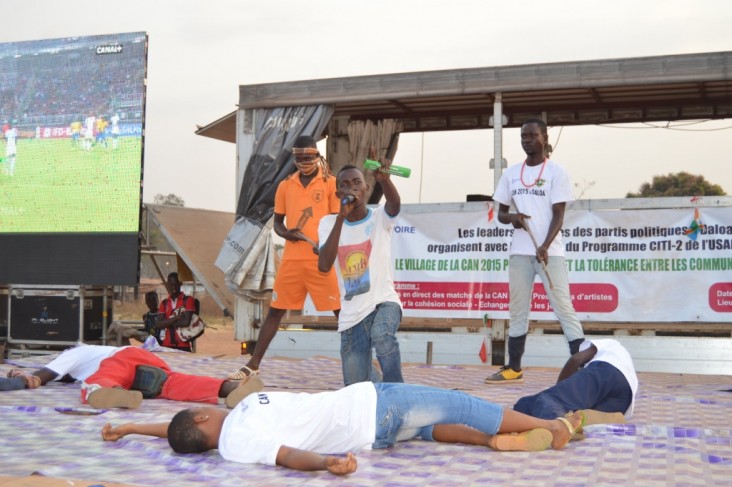
March 2015—Soccer is a major national pastime in Côte d'Ivoire, one that transcends ethnic divides that remain following the country’s 2010-2011 post-electoral crisis. The national team, Les Éléphants, is a major source of pride for the country, especially in light of their victory in the recent Africa Cup of Nations on Feb. 8.
Capitalizing on this unifying opportunity, in January and February 2015, USAID’s Office of Transition Initiatives supported a consortium of youth from varying political parties in Daloa—the Young Leaders Platform—to set up a “soccer village” to bring youth and communities together around the matches. The village contained a stage and large screen where community members from all backgrounds came to watch all 30 Africa Cup of Nations matches live.
The activity drew huge crowds for Côte d'Ivoire’s six matches, with more than 5,000 people present for the semi-final and final. Before and after the games and during half-time, well-known local performers took the stage to disseminate messages of peace and social cohesion through interactive sketches.
As one participant noted, “Much to our delight, it is the youth who took it upon themselves to organize this event that allows us to discuss and listen to each other’s point of view without resorting to violence.”
Following Côte d'Ivoire’s big win, another youth proclaimed in the streets, “Bété, Dioula—it’s the same thing!” referring to two major adversarial ethnic groups in the west of the country.
“This group of youth leaders representing the major political parties coming together around a unifying action is a great example to follow. They should be congratulated," said Ali Touré, a local football federation representative.
The team’s victory was celebrated by millions, some of whom took to the streets in Abidjan and others who watched from their television screens. With USAID continuing to support youth consortiums such as the Young Leaders Platform, unity, following years of economic and political division, is becoming more of a reality than ever before.
LINKS







Comment
Make a general inquiry or suggest an improvement.